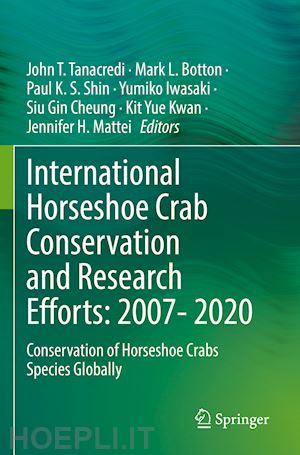
Questo prodotto usufruisce delle SPEDIZIONI GRATIS
selezionando l'opzione Corriere Veloce in fase di ordine.
Pagabile anche con Carta della cultura giovani e del merito, 18App Bonus Cultura e Carta del Docente
The “Proceedings of International Conferences on the Biology and Conservation of Horseshoe Crabs”, thus contains over 50 manuscripts and a diversified collection of documents, photos and memorabilia covering all four of the horseshoe crab species globally: their biology, ecology evolution, educational, and societal importance. This book exposes the impacts that humans have imposed on all four of these species, revealing through the coordinated effort of horseshoe crab scientists with the IUCN, of the worldwide need for a clear conservative effort to protect these paleo- survival organisms from a looming extinction event. Biologists, conservationists, educators, and health professionals will all welcome this book not only for exploration of its pharmacological interest, but also for the mystery of their longevity. This book also clarifies the future research needs and the conservation agenda for the species worldwide. Anyone working or studying estuaries on a global scale, will need to obtain this seminal work on horseshoe crabs.
John T. Tanacredi, Ph.D. is Professor of Earth and Environmental Sciences in the Biology, Chemistry and Environmental Studies Department and Director of the Center for Environmental Research and Coastal Oceans Monitoring (CERCOM) Field Station, at Molloy College, Rockville Centre, New York. He has held Research Associate positions at the Wildlife Conservation Society, New York Aquarium -Osborn Laboratories of Marine Science; at The American Museum of Natural History, at the Lamont Doherty Earth Observatory, Columbia University, and co-chair of the Conservation Committee of the Explorers Club. A Research Ecologist for 26 years in the US National Park Service, serving as Chief of the Division of Natural Resources and as one of the NPS’s Coastal Natural Resource Specialist duty stationed for 9 years at the Graduate School of Oceanography, University of Rhode Island, Narragansett, RI. An Environmental Analyst of the U.S. Coast Guard, Bridge Administration preparing NEPA environmental impact statements for bridge and highway construction in six eastern US states and was a U.S. Navy Flight Meteorologist “Hurricane Hunter”
Dr. Tanacredi received his doctorate in Environmental Health Engineering from Polytechnic University, M.S. degree in Environmental Health Sciences from Hunter College, Institute of Health Sciences, CUNY and BS in Biological Sciences from Richmond College, CUNY
He has published over 65 peer reviewed scientific research publications, written, and edited 7 books and has been included and interviewed in ahost of TV, Radio, and Social Media Outlets.
His co-edited book “Conservation and Biology of Horseshoe Crabs”, Springer, 2009 was one of the initiating factors in conducting the subsequent Asian Horseshoe Crab Conferences providing considerable support for including all four Horseshoe Crabs species on the IUCN’s “Red List”. His latest book, “The Redesigned Earth: An Introduction to Ecology for Engineers as if the Earth Really Mattered” (2019), by Springer- Nature, has received rave reviews.
Dr. Mark L. Botton is Professor of Biology in the Department of Natural Sciences at Fordham University – Lincoln Center in New York City, and Co-Director of the Environmental Science Program. He received his Bachelor’s degree in Biology from Stony Brook University, his Master’s degree in Biology from Brooklyn College, and his Ph.D. in Zoology from Rutgers University. Dr. Botton has published over 70 articles and book chapters on various aspects of horseshoe crab biology, including feeding ecology, mating behavior, the effects of pollution on developmental success, and population and conservation biology. He is the Co-Chairman of the Horseshoe Crab Specialist Group, IUCN Species Survival Commission.
Dr. Paul K.S. Shin is a retired Associate Professor at the City University of Hong Kong, Hong Kong SAR, China and a Fellow of the Chartered Institution of Water and Environmental Management in the UK. He is a benthic ecologist with research interest in community structure analysis, marine pollution and coastal conservation. He has been involved in the study and conservation of horseshoe crabs for the past 15 years. In collaboration with the Ocean Park Conservation Foundation, Hong Kong, he and Dr. S.G. Cheung initiated the Juvenile Horseshoe Crab Rearing Programme to promote conservation education to young generations through hands-on experience in taking care of juvenile horseshoe crabs at schoolswith subsequent release of these juveniles back to the wild. Dr. Shin received the Medal of Honour from the Hong Kong SAR Government in 2015 for his contribution to conservation and public services. Currently, he serves as the Co-Chair (South East Asia) of the IUCN SSC Horseshoe Crab Specialist Group.
Yumiko Iwasaki, Ph.D. Based on the fossil specimens from the Altiplano, Bolivia, she worked on the phylogenetic studies of the Devonian trilobite group, Phacopidae and a reconstruction of the Devonian paleobiogeography at American Museum of Natural History, NY, with Dr. Niles Eldredge who taught her the value of trilobites as (once) living beings. After receiving a Ph.D. degree in Geology and Paleontology (Invertebrates) from the Earth and Environmental Sciences, Graduate Center, City University of New York, she was hired as a Full-time Faculty at Dowling College, located along the shore of Great South Bay, Long Island, NY where her research interest extended to the behavioral











Il sito utilizza cookie ed altri strumenti di tracciamento che raccolgono informazioni dal dispositivo dell’utente. Oltre ai cookie tecnici ed analitici aggregati, strettamente necessari per il funzionamento di questo sito web, previo consenso dell’utente possono essere installati cookie di profilazione e marketing e cookie dei social media. Cliccando su “Accetto tutti i cookie” saranno attivate tutte le categorie di cookie. Per accettare solo deterninate categorie di cookie, cliccare invece su “Impostazioni cookie”. Chiudendo il banner o continuando a navigare saranno installati solo cookie tecnici. Per maggiori dettagli, consultare la Cookie Policy.